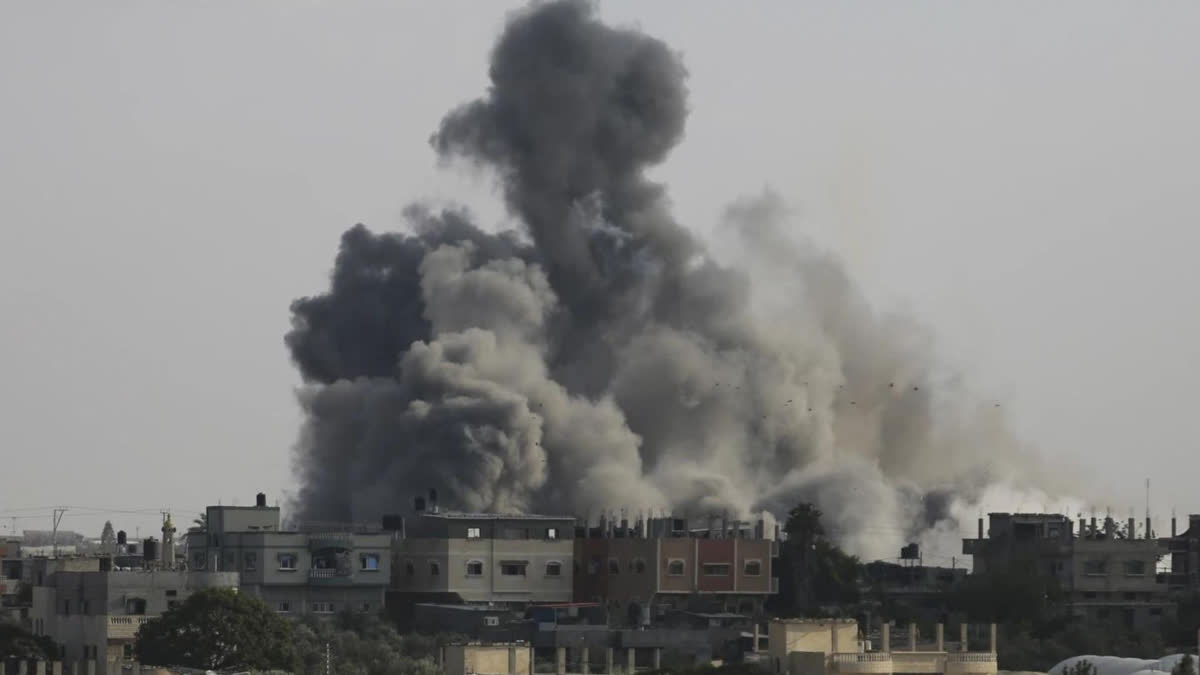Jerusalem : The Israeli military said it is responding to fire from Syria with artillery and mortar shelling. The military said Tuesday that unidentified projectiles were fired from Syria and appeared to have fallen in an open area. The flare-up comes as Israel is striking in Gaza in response to a stunning attack by Hamas and as exchanges of fire with the Lebanese Hezbollah have continued.
There was no immediate comment from Syria. The Syrian Observatory for Human Rights, a Britain-based opposition war monitor, said a Palestinian faction conducted the rocket attack from Syrian territory.
Earlier, Israeli warplanes hammered the Gaza Strip neighbourhood by neighbourhood on Tuesday, reducing buildings to rubble and sending people scrambling to find safety in the tiny, sealed-off territory now suffering severe retaliation for the deadly weekend attack by Hamas militants.
Humanitarian groups pleaded for the creation of corridors to get aid into Gaza, warning that hospitals overwhelmed with wounded people were running out of supplies. Israel has stopped entry of food, fuel and medicines into Gaza, and the sole remaining access from Egypt shut down Tuesday after airstrikes hit near the border crossing.
The war, which has claimed at least 1,900 lives on both sides, is expected to escalate. The weekend attack that Hamas said was retribution for worsening conditions for Palestinians under Israeli occupation has fired Israel's determination to crush the group's hold in Gaza raising the risk of an expanded regional conflict.
Hamas militants stormed into Israel on Saturday morning, slaying hundreds of residents in homes and streets near the Gaza border and bringing gunbattles to Israeli towns for the first time in decades. Hamas and other militant groups in Gaza hold about 150 soldiers and civilians hostage, according to Israel. Israel stepped up its offensive on Tuesday, expanding the mobilisation of reservists to 360,000, according to Israeli media. Israel's military said Tuesday that it had regained effective control over areas Hamas attacked in its south, and of the Gaza border.
A looming question is whether Israel will launch a ground assault into Gaza a 40 kilometer-long (25 mile-long) strip of land wedged among Israel, Egypt and the Mediterranean Sea that is home to 2.3 million people and has been governed by Hamas since 2007. On Tuesday, a large part of Gaza City's Rimal neighbourhood was reduced to rubble after warplanes bombarded it for hours the night before. Residents found buildings torn in half or demolished to mounds of concrete and rebar. Cars were flattened and trees burned out on residential streets transformed into moonscapes.
Palestinian Civil Defense forces pulled Abdullah Musleh out of his basement together with 30 others after their apartment building was flattened. I sell toys, not missiles,' the 46-year-old said, weeping. I want to leave Gaza. Why do I have to stay here? I lost my home and my job.
The Israeli military said it struck hundreds of targets in Rimal, an upscale district home to ministries of the Hamas-run government, universities, media organizations and the aid agency offices. In a new tactic, Israel is warning civilians to evacuate neighbourhood after neighbourhood, and then inflicting devastation, in what could be a prelude to a ground offensive. On Tuesday, the military told residents of the nearby al-Daraj neighbourhood to evacuate, and soon after new explosions rocked the area, and Rimal, continuing after nightfall. One strike hit Gaza City's seaport, setting fishing boats aflame.
There is no safe place in Gaza right now, you see decent people being killed every day, Hasan Jabar, a Gaza journalist, said after three Palestinian journalists were killed in the Rimal bombardment. I am genuinely afraid for my life. Tuesday afternoon, Hamas fired barrages of rockets toward the southern Israeli city of Ashkelon and Tel Aviv. There were no immediate reports of casualties.
Israel's new tactics could point to its new objective. Four previous rounds of Israel-Hamas fighting between 2008 and 2021 all ended inconclusively, with Hamas emerging battered but still in control. This time, Israel's government is under intense pressure from the public to topple Hamas, a goal considered unachievable in the past because it would require a reoccupation of the Gaza Strip, at least temporarily.
The objective is for this war to end very differently from all of the previous rounds. There has to be a clear victory, said Chuck Freilich, a former deputy national security adviser in Israel. Weakening Hamas was not enough, "whatever has to be done to fundamentally change the situation will have to be done, he said.



